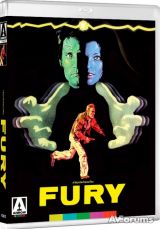MOST SEEM TO AGREE THAT REMAKE IS OVERSHADOWED BY ORIGINAL
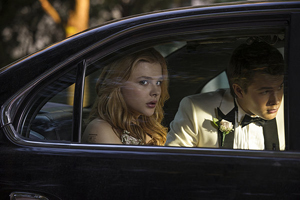 Some early reviews of Kimberly Peirce's new adaptation of Stephen King's Carrie agree that the new version cannot seem to get out from under the shadow of Brian De Palma's 1976 film (although one critic feels the new version is better than De Palma's). Here are the links and some quotes:
Some early reviews of Kimberly Peirce's new adaptation of Stephen King's Carrie agree that the new version cannot seem to get out from under the shadow of Brian De Palma's 1976 film (although one critic feels the new version is better than De Palma's). Here are the links and some quotes:Rafer Guzman, Newsday
"For the most part, the new movie merely imitates the old one, sometimes shot for shot and word for word. It makes superficial updates -- modern hair, modern clothes, a viral video of Carrie being humiliated in the gymnasium shower -- without adding any original spin or thematic embellishment. And aside from Judy Greer as Carrie's well-meaning gym teacher, the movie's supporting cast is unmemorable. Portia Doubleday and Alex Russell are no replacements for Nancy Allen and John Travolta as Carrie's main tormentors.
"With nothing new to offer, Carrie is reduced to attempting the impossible: repeating De Palma's long, tense buildup to Carrie's prom, one of the most stylishly executed horror-film sequences in history. Peirce doesn't dare rip off De Palma's famous split screen -- no director would -- so the disappointment is inevitable.
"Peirce has already made a better version of this story anyway, her phenomenal 1999 film Boys Don't Cry, about a small-town transgender girl who learns just how far a herd mentality can go. It's far more effective, and far more horrifying, than Carrie."
James Verniere, Boston Herald
"As talented as they are, 16-year-old Chloe Grace Moretz and Julianne Moore do not look a bit alike and have their hands full trying to make us forget the original actors. Epic fail...
"This present-day adaptation, scripted by Glee scribe Roberto Aguirre-Sacasa, starts out over-the-top and is hysterical in more ways than one.
"The book and original film’s 1970s setting, which as usual for King seemed more like the 1950s of his youth, lent itself better to some of the subject matter. It’s hard to believe that Carrie could be so naive in the age of the Internet, viral videos and Twitter. In fact, this Carrie Googles 'telekinesis,' and the video of her writhing on the shower floor as her classmates chant, 'Plug it up' is posted online.
"Peirce ups the ante on the carnage and rewinds the bucket scene so many times she induces howls of laughter instead of terror. Still, King’s keen sense for the horror lurking just beneath our cherished ceremonies peeks through in the prom scenes.
"In the role of the sympathetic gym teacher played by Betty Buckley in the original, Judy Greer tries. But not even she can help this poor movie."
Karen D'Souza, San Jose Mercury News
"That the opening scene is by far the most chilling in the movie is both the strength of this remake and its key weakness. Peirce shines such a harsh spotlight on the twisted love between the religious zealot mother, Margaret White (played with heart-pounding menace by Julianne Moore), and her misfit daughter Carrie (Chloe Grace Moretz) that the rest of Carrie's connections to the world seem like an afterthought. Home is the real horror here. Moore's captivating performance steals some of the thunder because very little else in the picture can rival it.
"While Peirce pays homage to Brian De Palma's 1976 original by echoing many of the iconic film's seminal moments, she diminishes the bite of the bullying that Carrie endures from her peers. That's a pity because it robs this bloody revenge tragedy of its visceral impact...
"For all its cheesy '70s vibe, De Palma's movie far better captured the primal, almost Lord of the Flies nature of the high school experience, the sheer terror of being a social outcast. That's what really gave the Carrie myth such staying power in pop culture.
"At its core, Carrie captured something painful and true about adolescence.
"It doesn't help matters that Moretz has an undeniable spunkiness, a quality showcased in Kick-Ass, so it's hard to shake the feeling that she could hold her own with or without telekinesis. For the record, Peirce also pumps up the blood-splattering pyrotechnics of Carrie's powers. Once she sheds her meek facade, this is a Carrie who can split the earth beneath her with a stomp of her foot. She always seems more in control of her sorcery and far more formidable than the fragile and delicate Sissy Spacek."
Matt Pais, RedEye Chicago
"Not just the best horror in ages but a remarkably astute teen drama, Carrie will make those who have seen Brian De Palma’s 1976 adaptation of Stephen King’s novel see the story with entirely different eyes. That tone-deaf, unjustly beloved original film is weak sauce. The new, modernized interpretation is hot lava."
David Rooney, Hollywood Reporter
"While 1970s horror is a long way from 1950s romantic comedy, Sissy Spacek’s performance in Brian De Palma’s Carrie left no less indelible an imprint on the role than, say, Audrey Hepburn in Sabrina or Judy Holliday in Born Yesterday. And as the folks behind the lifeless '90s remakes of those films learned the hard way, messing with a classic -- particularly one with such an iconic lead -- is a losing proposition. So it’s surprising that Kimberly Peirce’s respectful Carrie overhaul is as entertaining as it is, even if the prom-night bloodbath never escapes the long shadow of its predecessor.
"Pauline Kael summed up the singular pleasures of the De Palma film, calling it 'a terrifyingly lyrical thriller.' She went on to describe its 'perverse mixture of comedy and horror and tension, like that of Hitchcock or Polanski, but with a lulling sensuousness.' The lyricism and playfulness are both in shorter supply here. But while the remake is at times too self-serious, it’s never boring or dumb, which is often the case with horror updates...
The pairing of a director new to the genre and the promise of a return to King’s source novel made it natural to expect a fresh stamp on the material. However, the remake is less faithful to the book than was the 2002 television version, with Angela Bettis and Patricia Clarkson. In fact it frequently seems like a slavish homage to De Palma’s film, recycling much of the same dialogue. Both adaptations share a screenwriter, Lawrence D. Cohen, working here with Roberto Aguirre-Sacasa."
Screen Daily
"Stepping into the blood-soaked prom dress made famous by Sissy Spacek in the 1976 film adaptation of Stephen King’s novel of the same name, Chloë Grace Moretz toplines director Kimberly Peirce’s Carrie, about a shy outcast who ends up unleashing telekinetic terror on her classmates. Passable only as a piece of recast entertainment for those who’ve never heard of the original, much less seen it, Carrie doesn’t plumb the depths of adolescent isolation its premise obliges. There doesn’t seem to be a pronounced rationale, beyond commercial reward, for this relatively undistinguished remake...
"In a frustrating and somewhat confusing step backward, Peirce, in only her second feature since 1999’s striking Boys Don’t Cry, too often opts for conventional, traded close-ups, undercutting the potential tension of longer takes and wider compositions. She doesn’t seem particularly moved by or connected to the material, and while the editing isn’t what one would call flashy or over-caffeinated, it does frequently seem stilted.
"Given the verisimilitude a number of recent high school movies have achieved, Carrie feels overly posed, and artificial. Carrie’s life of privation provides some dramatic tension, but the original film was also a powerful metaphor for the searing pain of bullying and adolescent ostracisation on the whole. This adaptation doesn’t quite summon those feelings.
"At the core of Carrie’s emotional disconnection is Moretz’s performance. Spacek’s Oscar-nominated turn in the 1976 film casts a long enough shadow that any young actress would have some trouble escaping it. Spacek tapped into the title character’s pitiable qualities with such a consuming focus that it was at times painful to watch.
"Moretz, still just 16 years old (almost a decade younger than Spacek was at the time of filming), is a quite talented young actress, but lacks, at least here, the ability to convey an emotional hopelessness resulting from years of ground down self-esteem. Her Carrie is all over-articulated social shyness and body shame. The lack of any interior monologue results in a less honest blossoming of Carrie’s ever-fragile confidence and ergo a less cathartic finale — no matter the level of technical achievement brought to bear in Peirce’s bloody comeuppance for the bullies, which is the film’s indisputable high point."
Manohla Dargis, New York Times
"As in the first film, blood runs through Carrie, first as a symbolically suggestive trickle — initially as an unholy brew of menstruation and the blood of Christ — and then in great, gushing waves as the body count mounts. Ms. Peirce plays up the story’s religious themes and Carrie’s burgeoning power as she discovers her telekinetic gifts, even as the dread of the female body that deepens Mr. De Palma’s version somehow goes missing. This Carrie has its share of terrors, certainly, partly because of the seeming timelessness of its deeper, more resonant themes. Although now, when Carrie — one of the more memorable screen victims of bullying — locks the doors of the school gym and does her bloody worst, it’s a good guess that it won’t be the movie that you will be thinking about, but recent headlines."
Steven Rea, Philadelphia Inquirer
"Peirce's Carrie doesn't stray far from De Palma's - the sympathetic gym coach (Judy Greer), the handsome jock (Ansel Elgort) persuaded by his girlfriend (Gabriella Wilde) to invite Carrie to the prom, the shrewish princess (Portia Doubleday) who plots to humiliate Carrie. . . .
"And, of course, there's that tricky telekinesis business: As Carrie begins to find her true self, she realizes she has the power to move objects just by willing them - squinching up her eyes and waving her arms. At first, the cracked mirrors and exploding water coolers are a spontaneous manifestation of her rage, but with a little training and focus, and a reason to seek vengeance, well, let the cutlery and electrical cables, cars, and corpses fly!
"Note to Hollywood: Now, will somebody please let Peirce make the movies she really wants to make?"
Michael Phillips, Chicago Tribune
"Those with little or no personal relationship to the 1976 Brian De Palma-directed Carrie will find themselves in a different situation than I am on this one. I admit it. If I didn't love Sissy Spacek and Piper Laurie quite so madly in that movie — a film representing drive-in schlock elevated to Himalayan heights, with two of the great 1970s performances leading the way — I might've fallen further into the world of the remake. With all movies, really, we bring the baggage we bring.
"Some things are different, others are the same. Peirce delivers none of the voyeuristic nudity of the '76 edition. Even with the various killlings in the prom-night climax, when Carrie, slathered in pig's blood poured by her enemies, takes revenge, Peirce stages and shoots the action tastefully by R-rated horror standards. Even this remake's arresting prologue, depicting the bloody birth of Carrie into the conflicted, scissors-wielding hands of her unstable mother, has an air of restraint.
"The director, in other words, isn't an showboater or a sadist or a combination of the two, the way De Palma was behind the camera in the first Carrie movie, or the way Steven Spielberg tortured audiences with elan in that other '70s black-comic thriller classic, Jaws."
Owen Gleiberman, Entertainment Weekly
"Carrie, the rapturous and terrifying 1976 Brian De Palma thriller based on Stephen King's first novel, is a movie that has earned its place as a quirky horror milestone without, perhaps, ever having quite attained the status of a masterpiece. Yet I personally think it's a great film. There's nothing that compares to its glittery fusion of dreaminess and dread — of Cinderella-at-the-prom fantasy and blood-bucket horror, all mixed up with elements of ‘70s teensploitation comedy and primally entangled mother-daughter tragedy. And what acting! Sissy Spacek, as the squashed-nerd telekinetic high school wallflower Carrie, and Piper Laurie, as her ragingly repressed Evangelical mom, achieved a tremulous power together. And De Palma, a prankish virtuoso, perched the whole thing on the knife's edge between sincerity and satire. Carrie is a timeless movie because it's both one of the most passionate and most scandalously funny horror films ever made.
"So what does one do for a remake encore? Kimberly Peirce, the gifted director of the new Carrie, has gone down what seems, on the surface, to be a savvy road. She follows De Palma's version quite faithfully, evoking everything from his camera angles to his lighting to his flying-object F/X to his gleeful staging of mean-girl antics. At the same time, she offers just enough tweaks and updated details to present the material in a new way...
"Despite being 40 years old now, the Carrie story lives quite comfortably in the 21st century. Here's the problem, though. The original film had King's ingenious plot, with its fusion of innocence and cruelty and that subliminal wink of demonic takeover, but it also had De Palma's voluptuous operatic style, which gave the story the quality of a daydream-turned-nightmare. When you take away that style and serve up the plot fairly straight, as Peirce does here, we seem to be watching a Carrie that's been flattened, robbed of its over-the-top emotional extravagance.
"Given the challenge of revamping Spacek's brilliant shivery-nerd-turned-avenger performance, Chloë Grace Moretz does a creditable job. In stiff hair and lumpish clothing, she's very much the geek outsider (though today there's a much greater context for geeks as heroines), and the emotions seem to bleed through her ghostly, lunar-pale skin. Yet the way Peirce has updated Carrie White, without making any overt changes to the character, is to portray her as a little less clueless, a little less pathetic, a little more defiant. She's now a cute, bright, painfully shy girl who sees herself (wrongly) as a loser. Before, she was a total walking blob of misery and dysfunction. That slight tonal shift robs the story of its masochistic edge.
"Of course, Carrie isn't merely a fable of adolescent agony. It's all about Carrie's revenge, once she's subjected to the most diabolical practical 'joke' in movie history. Carrie's telekinetic powers, driven by the rage she represses, allowed De Palma to orchestrate a senior-prom apocalypse that was pure filmmaking mastery. Peirce stages the prom as a prosaic rerun, without a lot of gaudy inspiration. And it's here that the real problem with redoing a classic reveals itself. Sure, a lot of famous movies are timeless, yet they're also rooted in their time. In the original Carrie, Spacek's character seemed to be channeling something creepy and larger-than-life — maybe it was even the underworld. But now we're a lot more accustomed to seeing movie characters mold their destiny through special effects, and since Peirce films the climax in a rather depersonalized, shoot-the-works way, Carrie comes close to seeming like an especially alienated member of the X-Men team. She blows stuff up real good, in a way that would make the devil — or Bruce Willis — proud."
Updated: Friday, October 18, 2013 1:08 AM CDT
Post Comment | Permalink | Share This Post




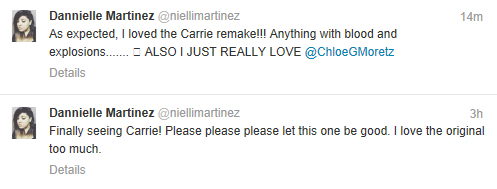
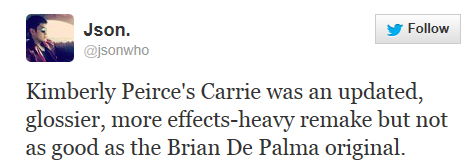
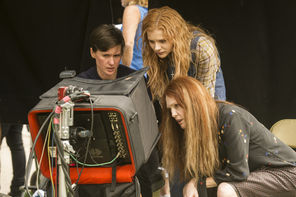 A lot of Carrie material everywhere (but no reviews yet of the new version)-- here are some links and quotes:
A lot of Carrie material everywhere (but no reviews yet of the new version)-- here are some links and quotes: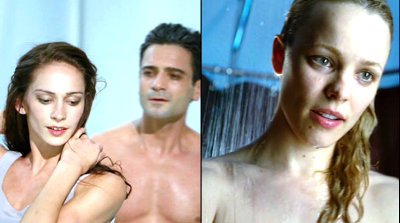
 Brian De Palma's Phantom Of The Paradise will screen at 7pm this Wednesday (October 16th) at
Brian De Palma's Phantom Of The Paradise will screen at 7pm this Wednesday (October 16th) at 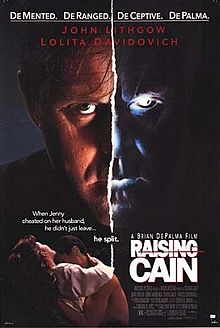

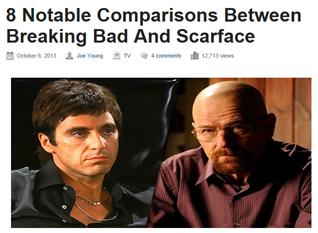 Breaking Bad creator Vince Gilligan has said that he envisioned his show as Mr. Chips becoming Scarface. Now that the AMC series has come to a close,
Breaking Bad creator Vince Gilligan has said that he envisioned his show as Mr. Chips becoming Scarface. Now that the AMC series has come to a close, 